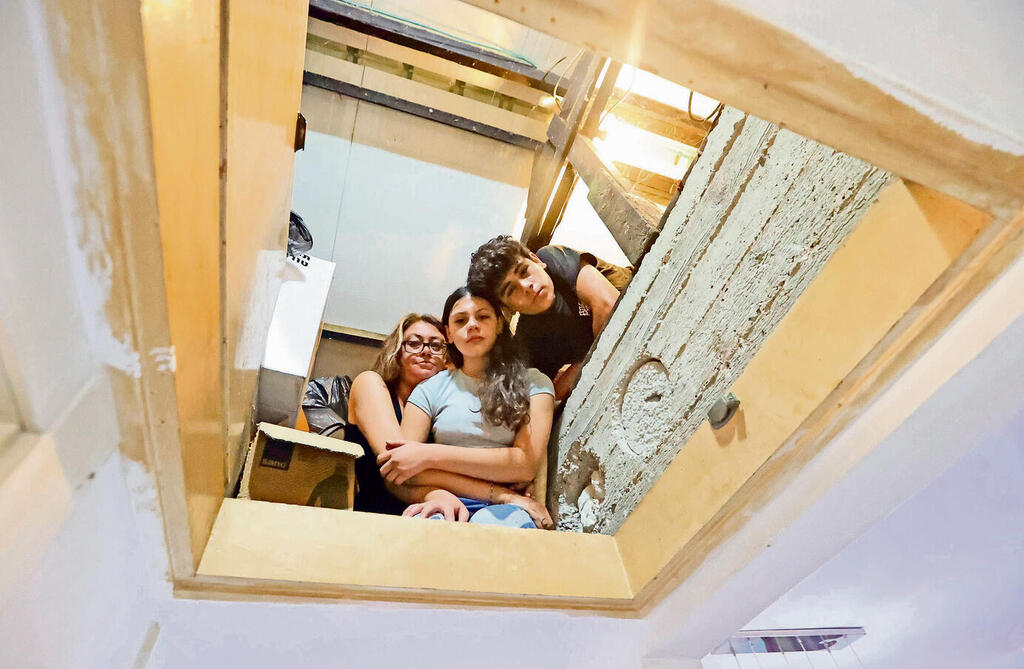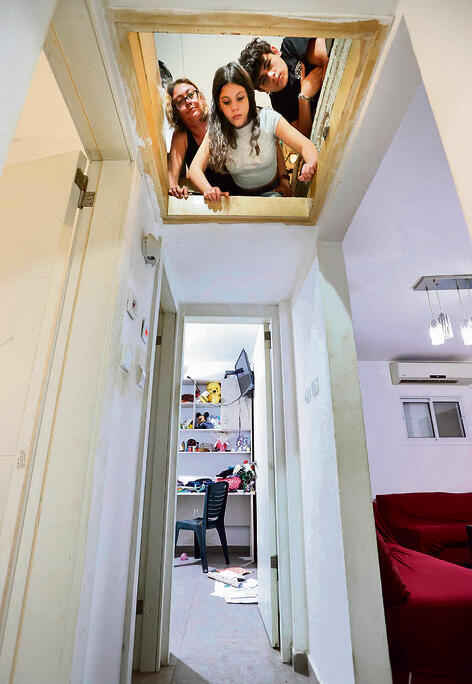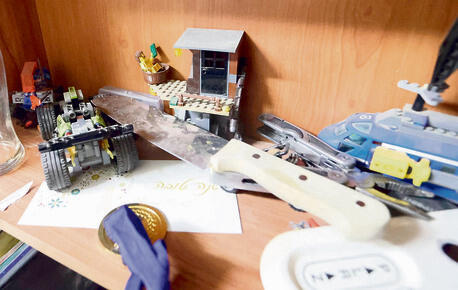Getting your Trinity Audio player ready...
It was scorching hot in the Kleiman family's attic in Kibbutz Holit. Breathing and moving were almost impossible in the cramped space meant for storage, not for people. The suffocating feeling Wednesday was reminiscent of what the family felt on October 7, with one key difference: on that Saturday, they had no choice.
For 11 hours, Harida, Lior and their children Hili, 13, and Idan, 16, hid in the small attic, while armed terrorists roamed around their house, killing neighbors and burning homes. Cramped between the roof tiles and the house's ceiling, the family prayed for a miracle and began saying goodbye to their relatives. The situation inevitably reminded them of other times in history when Jewish families hid in attics with little food and water while massacres raged outside.
"Ever since kibbutz members heard our story from October 7, they've been calling me Harida Frank," the mother of the family recounted with a smile, before her expression turned serious. "Yes, definitely, those were Holocaust hours. Hours when I realized we didn’t have much time left to live."
She came to Kibbutz Holit from South Africa as a volunteer 25 years ago, fell in love with Lior, a farm boy, and decided to stay. They settled near Lior’s parents, who work in the kibbutz dairy.
"I can't explain it, but somewhere in my subconscious, I always thought our attic would be a great hiding place if, heaven forbid, we ever needed it," Lior said. "I never thought we’d actually hide there one day."
"I always feared a terrorist invasion of the kibbutz and considered our attic a good hiding option, but I never seriously thought about it," Harida added.
On the morning of October 7, they woke up to the sound of sirens like everyone else. "We didn't understand what was really happening," Harida recalled. "After a few minutes, I went to the balcony hidden by a curtain and suddenly heard voices speaking Arabic. I moved the curtain aside and couldn't believe my eyes: about ten armed terrorists were walking on the lawn behind the house. I told Lior and the kids that we had to hide because there were terrorists outside."
With quick instinctive thinking she still can't explain, Harida decided not to hide in the reinforced safe room, which tragically turned into a death trap for many residents of the Gaza border communities who acted instinctively when the sirens sounded. "Go up to the attic," she whispered to her family.
Hili climbed into the attic using a chair, and Lior and Idan held onto the edges and pulled themselves up. "I thought about using the chair too," Harida said, "but I was afraid that if the terrorists came in, they would see the chair under the opening and know we were inside. I put the chair back, took a bottle of water, a knife and a pack of cigarettes, and Lior and Idan pulled me up, and we closed the wooden door."
Meanwhile, the terrorists were massacring kibbutz members. Of the 15 people killed in Holit, 11 were neighbors of the Kleimans, whose house was damaged by an explosion nearby. "I realized that if they broke into the house and saw no one in the rooms or the security room, they would just leave, so I left the doors open," Harida recounted.
"We only had one bottle of water, which was gone within an hour. We had no food at all. I wrote to my nephew in South Africa, 'We love you. Hope to see you again. The situation is bad. I don't think we'll survive. I'm scared. Goodbye.' I already understood this was the end. The kids were terrified. We didn't say a word the entire time we were there."
Harida's quick thinking saved her family's lives. Hiding in the attic, maintaining complete silence and keeping the lights off made the terrorists believe the house was empty, and they skipped over it.
"After 11 hours, IDF forces arrived and told us it was safe to come out," Harida recalls the moment they could finally breathe a sigh of relief. "At first, we didn't believe they were really IDF soldiers because there was a warning in the kibbutz that some terrorists were disguised as soldiers. Eventually, a Sayeret Matkal unit rescued us."
The family has visited the house several times since then, and they are now packing for the move to the temporary neighborhood built for Holit members in Kibbutz Revivim. However, the attic has remained closed.
On Wednesday, for the first time, they mustered the courage to open the wooden door and enter the narrow space filled with memories of those 11 hours between life and death.
"I have terrible flashbacks just from entering here," Harida said. "I tremble at the thought of what we went through. But it was important for me to do this. It's a significant closure before we leave the house. This is where our lives were saved."






